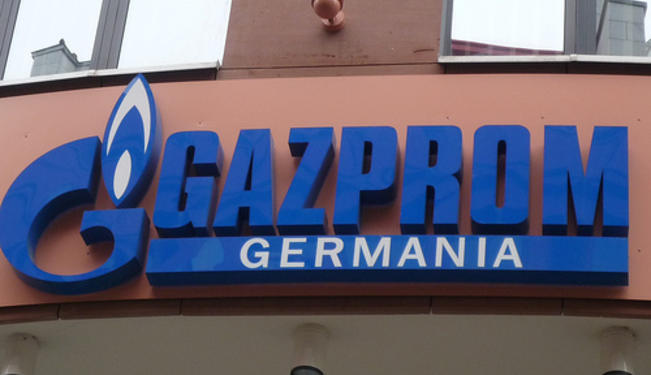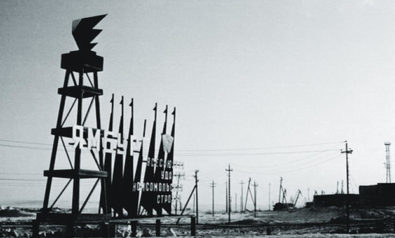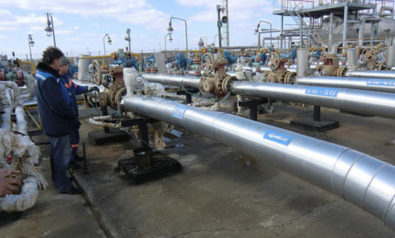An analysis of Gazprom’s kaleidoscope of blackmail for exercising influence in Eastern Europe.
In 2006, Elmar Brok, member of the European Parliament for the Christian Democratic Union (CDU), raised the alarm about Gazprom’s expansionary efforts. Before that, Gazprom had announced that it would partly shut off its gas supplies to Europe if its plans for expansion in Europe were blocked. “Brok warned that the Russian energy company was pursuing a strategy not only to become the EU's biggest energy supplier, but also to gain control over the supplier networks and transit rights to ensure that “nothing happens without Gazprom.”
More than a fourth of all the oil needed by the EU comes from Russia. “According to calculations by the German Bundestag (lower house of German Parliament), the EU’s dependency will increase by 60% around 2030. Bulgaria, Estonia, Finland, Latvia, Lithuania, and Slovakia depend 100% on Russian gas and therefore on Gazprom, whereas other countries such as Denmark, Sweden, Spain, Ireland, Portugal, and Luxembourg are completely independent from Gazprom. Belgium, France, Romania, and the Netherlands rely on Russian gas supply only on a small scale, whereas the Czech Republic, Greece, Hungary, and Slovenia depend heavily on Russian supplies, with Austria almost at 63%. Poland, Germany, and Italy are heavily dependent on Russian gas as well, though their dependency is below 50% of their total energy needs.
Being dependent means being prone to blackmail. Consumer prices can be increased without really provoking resistance whenever it seems necessary – even if the reason is simply to exercise political pressure. The case with Latvia illustrates that when it comes to energy supply, the Baltic States have not fallen voluntarily into Russia’s welcoming arms.
To the present day, Latvia is bound down by a contract that was concluded with the state-owned energy company United Russian Energy Systems (RAO JES) in February 2001. All attempts to terminate this agreement came to nothing, despite very different governments in Latvia having tried. The contracts had to be renewed again and again. Statements like the one made by the chairman of Latvia’s energy supply, illustrate the helplessness of regional supplier companies: “We cannot and we do not want to fight against the most powerful energy company”.
Latvian Prime Minister Algirdas Brazauskas (2001-2006) said: “this is the first time, in my whole term of office, that I have experienced such a negative influence of a Russian energy company or of the Russian secret service on the Latvian energy system”.
Shortly before that, it became known that a Russian KGB-agent operating from Vienna was trying to take over a Latvian nuclear power plant for RAO JES. To journalist Boris Reitschuster’s question of whether Russia was using gas supply as a political weapon, the then president of Ukraine, Viktor Juschtschenko, replied: “It is really bad that matters of energy are being politicized”… “More and more countries will feel this threat. This is not a problem of Ukraine; it is one of the whole world, including Europe and Germany.”
Two years later, Spiegel Online wrote: “The threat is as dramatic as it is obvious. Russian state-owned Gazprom made the European gas supply dependent on the outcomes of the presidential elections in Ukraine. Russia claims to be interested in ‘getting things straight’.” But Ukraine had already been held at knifepoint in early 2008.
On February 4th 2008, Ukraine’s then Prime Minister Yulia Tymoshenko met with Viktor Chernomyrdin, the Russian ambassador, in her private residence at his request. Ukraine’s accession to NATO, a heartfelt wish of then Ukrainian President Viktor Juschtschenko, was the only topic discussed during this meeting. In his conversation with Prime Minister Tymoshenko, the Russian ambassador made clear that there would be an open commercial war if Ukraine pursued its plan to join NATO.
On a visit to Kiev in June 2008, German chancellor Angela Merkel welcomed the suggestion of Ukraine’s accession to NATO and said, “The Ukraine is going to be a NATO member.” This was of course not at all in Russian’s interest.
According to Victor Chernomyrdin, founder of Gazprom and then Russian ambassador to Ukraine, accession to NATO would mean that Russia would press for Ukraine to be excluded from the Commonwealth of Independent States (CIS) and would immediately stop Ukrainian energy supplies. The Ukraine would have to pay its outstanding debts immediately and Russia would use its influence on other CIS countries to impose additional economic sanctions against Ukraine. The ambassador affirmed that he was serious about his threats.
For Russia, the Kremlin, and thereby for Gazprom, “getting things straight” meant that reigning Prime Minister Yulia Tymoshenko had to lose both the presidential elections in February 2010 and the parliamentary elections in March 2010 in order for Viktor Yanukovych, who was still loyal to Moscow at that time, to come into power. Ms. Tymoshenko lost the election. Consequently, the Kremlin rewarded Ukraine with gas at extremely reduced prices. A deal was reached: “Russia may garrison its Black Sea fleet for at least 25 to 30 years on the Crimea. In return the Ukraine gets a discount of 30% on the agreed price for Russian gas deliveries.”
However, on the 15th of August 2011, Russian news agency RIA Nowosti reported: “Russia and Ukraine: All signs indicate war”. The reasons given included high energy prices and an adhesion contract by Gazprom.
This incident revives memories of similar doings by Gazprom. For a long time, Russia was the only gas supplier to Georgia. Tbilisi got its gas from Gazprom and an intermediary company Itera that was closely connected to Gazprom. Since Georgia’s President, Michail Sakaschwili had come to power in 2004, Georgia tried to become more independent of Russian gas supply – but without any success. Stories featured headlines such as: “Putin’s government has been using gas supply numerous times during the last years, to put pressure on its Western-oriented neighbor.”
In 2006, an increase in gas prices was pending; they were about to double. Initially, the government in Tbilisi refused to pay these extremely increased prices for gas. It stated that the price change hid political motives and that gas was being used as a political weapon against President Sakaschwili, who was unpopular with the Kremlin. Gazprom threatened to shut off gas supply to Georgia. After Russia rejected plans for gas pipelines from Kazakhstan to Georgia via Russia, the government in Tbilisi caved under the pressure and agreed to pay.
One may think that such situations only occurred far away from Europe, but was that really true?
Latvia’s oil supply was shut off in 2003; the same happened in Lithuania between 1992 and 2002 and once more in 2006. Poland was cut off from gas in 2004, and the Czech Republic from oil in 2008, not to mention the so-called ‘gas war’ between Russia and Ukraine in 2006. In January 2006, the most important German oil refinery in Schwedt stopped receiving oil via the pipeline with the fitting name Druschba (friendship) and in Leuna, oil deliveries were also halted a year later for “business reasons".
Based in Berlin, Gazprom Germania, the most powerful affiliate company of Gazprom, defended itself against allegations of blackmail. In a leaflet released in the summer of 2007, titled “Gazprom Germania – Economic success is not everything”, the sponsorship activities of the company were described: “As a sponsor we want to show the people that the companies of the Gazprom-Group are reputable and responsible within the international market and can offer long-term security, especially to Europe’s energy sector. As every other company, we work in a market-oriented way and respect the individual national circumstances of the countries we work in."
Everyone can decide for themselves whether to believe that or not. Anyhow, in 2011, investigators from the EU were raiding gas suppliers such as E.ON, Ruhrgas and Gazprom Germania in east and central Europe: “Gas suppliers stand accused of sharing markets, arranging price agreements and preventing competing companies for example from entering their natural gas networks. These constraints on competition can eventually affect the customer because of fewer options and higher prices.”
It did not take long for this to provoke a reaction from Moscow. Vladimir Putin (then Prime Minister) reacted by pointing out that he hoped no one had been arrested and put in jail for closing contracts with Gazprom and that “[the] government will watch closely everything that happens around Gazprom."
Gazprom CEO Alexej Miller was quoted as saying: “This is an embarrassing surprise.”
No one in Moscow expected that Gazprom could be questioned by anyone in Europe. However, Europe still depends on Russian gas and is therefore ever prone to being blackmailed.
The views expressed in this article are the author's own and do not necessarily reflect Fair Observer’s editorial policy.
Support Fair Observer
We rely on your support for our independence, diversity and quality.
For more than 10 years, Fair Observer has been free, fair and independent. No billionaire owns us, no advertisers control us. We are a reader-supported nonprofit. Unlike many other publications, we keep our content free for readers regardless of where they live or whether they can afford to pay. We have no paywalls and no ads.
In the post-truth era of fake news, echo chambers and filter bubbles, we publish a plurality of perspectives from around the world. Anyone can publish with us, but everyone goes through a rigorous editorial process. So, you get fact-checked, well-reasoned content instead of noise.
We publish 2,500+ voices from 90+ countries. We also conduct education and training programs
on subjects ranging from digital media and journalism to writing and critical thinking. This
doesn’t come cheap. Servers, editors, trainers and web developers cost
money.
Please consider supporting us on a regular basis as a recurring donor or a
sustaining member.
Will you support FO’s journalism?
We rely on your support for our independence, diversity and quality.







Comment